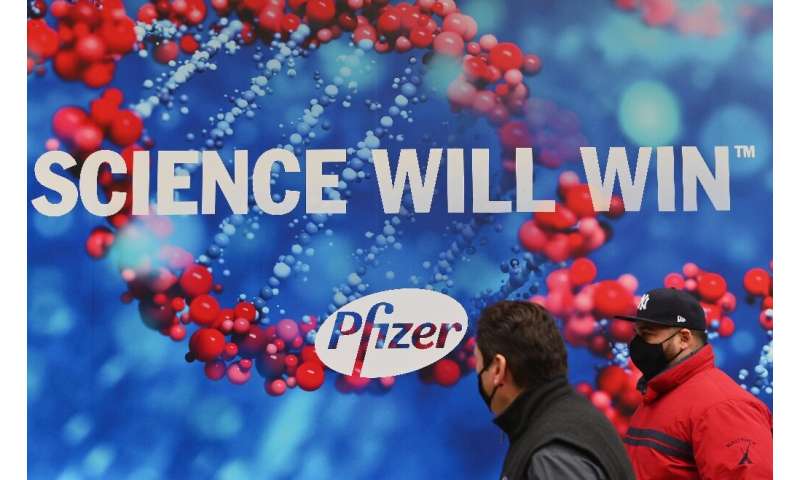US experts debate Pfizer COVID-19 vaccine in live event


Britain and Canada have already approved the Pfizer-BioNTech COVID-19 vaccine—will the United States be next?
Two dozen independent experts convened by the Food and Drug Administration (FDA) will spend Thursday debating the issue during a livestreamed public event, an exercise in transparency unmatched by any other regulatory agency.
At the end of the day, the members of the Vaccines and Related Biological Products Advisory Committee (VRBPAC) will hold a vote on whether or not to recommend that the FDA issues an emergency use authorization (EUA).
The outcome isn’t seriously in doubt, after the FDA released a highly detailed briefing document Tuesday that was upbeat about the two-dose regimen’s safety and efficacy.
Highlights include that the vaccine appears to offer strong protection even after the first of its two doses, given 21 days apart—though the makers still strongly recommend people take both.
The panel’s recommendations aren’t binding, but its guidance is usually followed.
“We could then have an EUA within days and be administering doses of vaccine to our most vulnerable next week,” Health and Human Services Secretary Alex Azar said Wednesday.
In a trial of 38,000 people, there were two deaths in the vaccine arm and three in the placebo. There were 18 potentially life-threatening events in the vaccine group compared to 19 in the placebo.
Since there was no meaningful imbalance in those numbers between the two groups, experts see no serious safety concerns.
The most common side effects were run of the mill for vaccines, such as injection site reactions— seen in around 80 percent of cases—fatigue—seen in about 60 percent—and headache—seen in about 55 percent.
But Britain on Wednesday reported that two health care workers developed significant allergic reactions to the vaccine as the country rolled out its massive drive Tuesday.
Should the US panel vote to approve, they will almost certainly recommend people who are predisposed to allergic reactions should hold off on vaccination for now.
And there were four people among the vaccine arm’s 19,000 subjects who developed Bell’s palsy—a facial paralysis condition that is usually temporary—but none in the placebo group.
“(The incidence) really very much mirrors what one would expect if you just took 20,000 people off the street,” Anthony Geraci, an associate professor of neurology at Hofstra University told AFP—but the FDA document recommended collecting more follow-up data.
Together, the FDA and Pfizer have put together 144 pages of data covering 44,000 subjects, which is far more information than has been released about two already widely used Russian and Chinese vaccines.
Eric Rubin, a Harvard Medical School biologist who is among the experts that will vote Thursday, told AFP: “There was excellent transparency in both the Pfizer package and the FDA synthesis of the data.”
The FDA is considered the world’s foremost regulator, but its reputation took a hit over perceptions that President Donald Trump had leaned on it to issue questionable authorizations, including for the drug hydroxychloroquine as a COVID-19 treatment, which was later revoked.
High efficacy
The first vaccine dose begins to protect patients ten days after injection, and the booster shot reduces the risk of developing COVID-19 by 95 percent compared to being unvaccinated.
The best news is that it also seems to stop the most severe forms of the disease, said Yale vaccinologist Saad Omer.
We don’t know yet how long the protection will last.
But top US government scientist Moncef Slaoui said Wednesday he was confident that, based on animal testing, the injection would create long-term immune memory rather than a response that quickly fades.
The other open question is how well the shot will stop virus transmission, even if someone doesn’t fall ill themselves.
The next step is distribution, which is being coordinated by the federal government but handled by private partners like FedEx.
The first wave of shipments will include around three million doses, which will be transported from the Pfizer plant in Kalamazoo, Michigan in dry ice containers kept at -70 degrees Celsius (-94 degrees Fahrenheit).
Source: Read Full Article